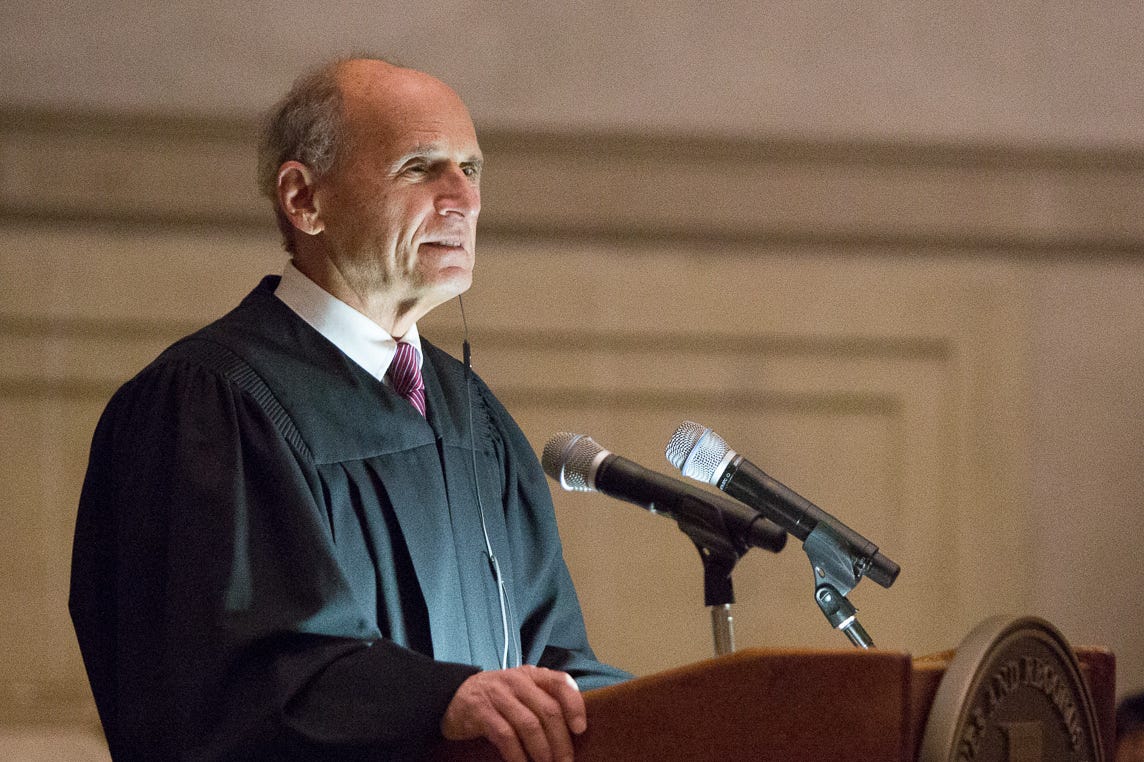Judge David S. Tatel on blindness and justice
The retired jurist reflects on how the courts became so politicized, and how getting a guide dog let him make peace with his loss of sight — and put him on the path towards writing his new memoir
David S. Tatel, the civil rights lawyer and eminent jurist who famously succeeded Ruth Bader Ginsburg on the U.S. Court of Appeals for the D.C. Circuit and had long been considered a likely choice for the Supreme Court, retired this year following a 30-year career. An erudite legal thinker who’s decided a series of important First Amendment, voting rights, and environmental cases, Judge Tatel is also well-known for his struggle with his loss of sight, which he first tried to conceal as an ambitious young lawyer, and finally made peace with later in his career.
In his forthcoming book, Vision: A Memoir of Blindness and Justice, the judge draws on his long service in one of the busiest, most significant federal courtrooms, and details his thoughts on the direction the courts have taken over the last several decades and his journey toward acceptance of his blindness, culminating in the adoption in 2019 of a guide dog, Vixen, and the way that experience transformed his life.
We present below an excerpt from the book, along with a conversation with Judge Tatel, placing his writing in the current historical moment, exploring the two intersecting threads — blindness and the evolution of the courts — that have defined his life, his analysis of the current state of the courts and their challenge to democracy, and what gives him hope for the future.
The book is a fascinating look into both Tatel’s thinking and the way the federal courts work (and don’t work), and the conversation is just as interesting. We hope you’ll enjoy it.
A request for those who haven’t yet joined us: The interviews and essays that we share here take research and editing and much more. We work hard, and we are eager to bring on more writers, more voices. But we need your help to keep this going. Join us today to support the kind of independent media you want to exist.
And today we’re offering you a special discount of 20 percent if you become a paying subscriber. You will lock in this lower price forever if you join us now!
How have the courts changed over the course of your career, and what’s important for people to understand about the courts now?
My concern is not so much about the results the courts are reaching — although I do have serious concerns about those, but the way the courts are reaching those decisions. I think they are increasingly doing so using decidedly non-judicial methods.
This goes back to what we all learned in the seventh grade about checks and balances. The judicial branch has potentially enormous power over the other two branches of government. The courts can declare laws of Congress unconstitutional and prevent the executive from taking certain actions. And the courts are the only unelected branch — they’re unaccountable politically.
Because of that, the courts developed a series of principles of judicial restraint: they follow their precedents, stay within their own jurisdictions, and don't tread on the responsibilities of the other agencies.
The basic problem today is that the courts are less faithful to these principles than they have been and should be.
Have the courts always been political, and we haven't noticed? Or is this new?
This is not the only time in our history when the courts have begun to go off the rails. But from my perspective, as Congress has become less functional, and less able to do its job — because of money, politics, and other things — the courts have become more involved in political battles.
So advocates on policy issues, mainly on the conservative side, have turned to using the courts to accomplish their objectives: the efforts to overrule Roe v. Wade, to limit administrative agencies, to expand gun rights, these kinds of issues.
And you do that through the appointment of judges. So, instead of confirmation hearings focusing on a judge's experience, understanding of the law, and commitment to judicial principles, the question has become, “Will you or will you not overrule Roe?”
Do you think some judges see themselves as acting politically?




